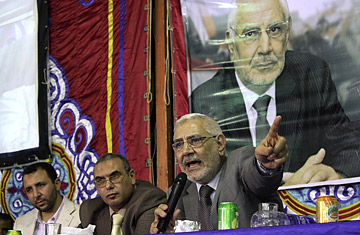
Aboul Fotouh speaks to a crowd in Zefta, Egypt, January 25, 2011.
(2 of 2)
Erian is quick to brush off the defections. He says they are small in number, unorganized and don't pose a threat. "We are not worried about such things because it is an ordinary thing that some people will separate," he says. "We will wait to see what their future is, if they form parties and how they go ahead." Those who have left the party will have a lot of catching up to do if they want to compete with the Brotherhood, especially in its capacity as a civil society organization, a role that wins it vast support on the ground — support it can cash into political capital.
Still, not all of the Brotherhood's breakaways are political neophytes, and if, as Erian says, the party isn't worried about dissidents, then why did it reportedly expel members who had attended a conference by presidential candidate Abdel Moneim Aboul Fotouh, a rebel from the Islamist group? Erian denies the account, published in several Egyptian newspapers, and says that the members were "criticized, only criticized, not punished at all" for breaking party ranks and attending the event organized by Aboul Fotouh.
Aboul Fotouh was a leading figure in the Brotherhood for decades, a popular reformist, who was expelled this summer for defying the party's decision not to enter the presidential race. He is now running for president, and drawing a lot of support from young, reform-minded Islamists like Ibrahim el-Houdaiby, 28, an independent who has emerged as one of the Brotherhood's most outspoken critics.
Houdaiby doesn't like to flaunt his family's storied history in the Brotherhood, but it is a pedigree that affords him a unique platform. Erudite, articulate and exceedingly modest, his great grandfather, Hassan el-Houdaiby, was the Brotherhood's second supreme guide after Banna's assassination in 1948. His grandfather was its sixth, serving between 2002 to 2004. "The Brotherhood is always occupied with the religious question, of proving their religious moderation, so that keeps them unfocused on different matters," Houdaiby says. "I have a lot of hope in somebody like Aboul Fotouh, particularly because of that. If you look at his political stances, you could never understand them as the political stances of an Islamist, and stop there. He's confident enough to move beyond the question of religion."
Houdaiby says that Aboul Fotouh appeals to Egyptian concerns about finding jobs, security, the rising cost of living and eliminating corruption. They are not focused on on the question of religious identity, like many Islamist politicians. A survey by the Egyptian Cabinet's Information and Decision Support Center published on Sunday, said that a whopping 65% of respondents would not even consider following a cleric's endorsement of a political candidate. Although sample size and other statistics about the survey were not provided, it's a fact from Islamabad to Cairo that influence from the pulpit doesn't necessarily translate into political power on the streets or in parliament. Islamic identity only becomes a powerful, unifying political force when it is threatened, as it was during the Mubarak years. That's why, as Houdaiby says, the Brotherhood, which "stood united for 80 years in the context of oppression, cannot stand in the context of freedom."
Houdaiby quit the party in 2008, for ideological reasons. There are four schools inside the Brotherhood, he says: Hassan el-Banna's, Salafists, the Qutbis, and the traditional Azhari school, promulgated by the venerable Al-Azhar institute in Cairo, Sunni Islam's foremost seat of learning. Houdaiby sympathies are for the Azhari school. The Brotherhood, he says, is now dominated by Qutbis and Salafis.
Still, the various groups have far more uniting them than dividing them. Tensions may arise if several Islamist candidates from across the ideological range vie for the same electoral seats. The so-called Coordinating Body for Islamist Political Action was recently formed by young men and women hoping to avoid such a scenario by encouraging the creation of unified Islamist lists for the upcoming election. But perhaps that sorting process is better left to the ballot box. Ultimately, it is the voters who will decide if an Islamist is an Islamist is an Islamist — and whether voting for one will make a big enough difference to their political and economic future.
